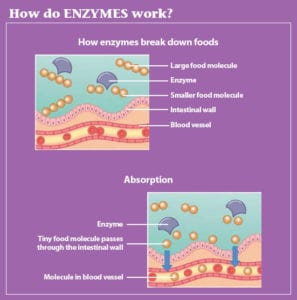Five Important Digestive Enzymes
Vitality Savannah Acupuncture

Carbohydrates and starches are digested by the enzyme amylase. A deficiency in amylases causes undigested carbohydrate molecules to pass on to the colon, where gut organisms break them down, literally fermenting them to produce carbon dioxide and water that lead to cramping, flatulence, and diarrhea.
Proteins are digested by the protease enzymes. A deficiency in proteases leaves protein molecules or fragments undigested. Again, these pass on to the colon, in this case giving rise to a host of unpleasant-smelling and potentially toxic molecules. Undigested protein in the colon has also been associated with colon cancer initiation, though the exact mechanisms are still under investigation.
Fats are digested by the lipase enzymes. A deficiency in lipases leaves long-chain fats undigested. Undigested fats cannot be absorbed anywhere in the body and are typically passed on through the GI tract to produce greasy, fatty stools, cramping, and even malnutrition when fat-soluble vitamins are lost.
Though several different digestive system organs produce some digestive enzymes, the pancreas makes all three of these essential digestive enzymes. Loss of pancreatic function is therefore a common cause of after-meal indigestion and other symptoms. Pancreatic insufficiency was long thought to be found only in patients with disorders of the pancreas itself, such as cystic fibrosis, pancreatitis, or pancreatic tumors. However, it is now recognized as being associated with aging. One recent study found pancreatic insufficiency in more than 7% of a large group of patients with general abdominal pain and discomfort.
Cellulase is the enzyme that breaks down cellulose, the indigestible polysaccharide in dietary fiber. Fiber is increasingly recognized as vital for healthy digestion because, though humans cannot break it down, it feeds the beneficial organisms in our colons, which use it to produce beneficial short-chain fatty acids that nourish our colonic cells and help to prevent cancer. But, precisely because we cannot digest fiber ourselves, it can produce symptoms of bloating, flatulence, diarrhea, and constipation when broken down by our intestinal tenants.
Lastly, lactase is the enzyme that breaks down milk sugar (lactose). A deficiency in lactase can prevent the body from breaking down lactose, leading to lactose intolerance, which can lead to abdominal cramping, belching, flatulence, diarrhea, and bloating.
excerpt from Life Extensions Magazine online. For entire article “Relief from Common Digestive Distress” visit:
http://www.lifeextension.com/magazine/2015/ss/relief-from-common-digestive-distress/page-01
